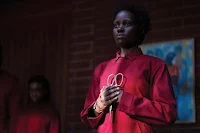Us * * *
Us is the eagerly awaited second film from Jordan Peale who gave us the runaway success Get Out.
I'm afraid I wasn't exactly blown away by this, but going by the plethora of positive reviews it has got I don't think my detraction will bother Jordan (or the box office) much.
Like Get Out, the ironically huge difference, and absolute similarity, between the lives of Black Americans and White Americans is center stage. But when it comes to the plot, my concern with Us is the same as Get Out : Peale just pushes it too far and over-explains the situation. If you ask me, those scissors which feature on the posters and in the movie should have been put to use in the cutting room.
We start off with a flashback, when a young girl has a frightening experience in a fun park where she sees her doppelganger.
Then we cut to today and find she is married with two children of her own. They are having a weekend in their holiday house near the beach. She has an ill feeling about being there as it is close to where she had her traumatising experience as a child. As the day and night unfolds we learn she is right to be concerned, especially when the shadow being of herself and the rest of her family pay a visit. But it doesn't stop there. Their all white friends down the road seem to be having the same experience.
Where are these doppelgangers coming from, and why are they emerging now?
The explanation given changes the story from an intriguing mystery, or modern day parable, to a really silly idea. There are also some dubious symbols: bible quotes, rabbits, and the 1986 event "hands across America". These references just seem to float about like decorative tinsel rather than becoming an integral part of the story.
On the positive side, the wonderful humour that was in Get Out continues. The scares and shocks are ramped up too, but now they are more brutal and bloody rather than threatening. If you're squeamish the gore is not so explicit that you need concern yourself. It's just the odd scissor to the throat or golf club to the side of the head, no big deal. There are no guns interestingly.
I would regard the concept of having to brutally kill yourself, or the image of a loving family member or friend, as philosophically interesting enough in it's own right. It certainly offers plenty of symbolism!
Once again Peale finishes up in "The Basement" (such a stereotype). This time it's the basement of the United States. It's a disappointing ending that goes on for too long and it feels like the magician is showing how the trick was done. I would have felt more satisfied being left with a sense of mystery, and an invitation to consider Us in my own way, rather than being given this tortuously contrived explanation.
I'm afraid I wasn't exactly blown away by this, but going by the plethora of positive reviews it has got I don't think my detraction will bother Jordan (or the box office) much.
Like Get Out, the ironically huge difference, and absolute similarity, between the lives of Black Americans and White Americans is center stage. But when it comes to the plot, my concern with Us is the same as Get Out : Peale just pushes it too far and over-explains the situation. If you ask me, those scissors which feature on the posters and in the movie should have been put to use in the cutting room.
 |
| What do you mean , don't run? |
Then we cut to today and find she is married with two children of her own. They are having a weekend in their holiday house near the beach. She has an ill feeling about being there as it is close to where she had her traumatising experience as a child. As the day and night unfolds we learn she is right to be concerned, especially when the shadow being of herself and the rest of her family pay a visit. But it doesn't stop there. Their all white friends down the road seem to be having the same experience.
Where are these doppelgangers coming from, and why are they emerging now?
The explanation given changes the story from an intriguing mystery, or modern day parable, to a really silly idea. There are also some dubious symbols: bible quotes, rabbits, and the 1986 event "hands across America". These references just seem to float about like decorative tinsel rather than becoming an integral part of the story.
On the positive side, the wonderful humour that was in Get Out continues. The scares and shocks are ramped up too, but now they are more brutal and bloody rather than threatening. If you're squeamish the gore is not so explicit that you need concern yourself. It's just the odd scissor to the throat or golf club to the side of the head, no big deal. There are no guns interestingly.
I would regard the concept of having to brutally kill yourself, or the image of a loving family member or friend, as philosophically interesting enough in it's own right. It certainly offers plenty of symbolism!
Once again Peale finishes up in "The Basement" (such a stereotype). This time it's the basement of the United States. It's a disappointing ending that goes on for too long and it feels like the magician is showing how the trick was done. I would have felt more satisfied being left with a sense of mystery, and an invitation to consider Us in my own way, rather than being given this tortuously contrived explanation.
Comments
Post a Comment